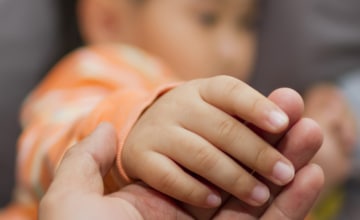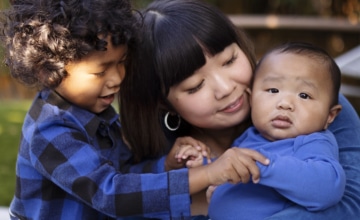Transforming policy for babies, toddlers, and their families
Positive experiences and emotionally nourishing relationships with parents and caregivers in the first three years of life are critical to ensuring children thrive. We all have a shared responsibility to nurture and protect each child and to support communities and families in creating the safe, stable, nurturing environment children need.
Families with young children often face challenges, stemming from economic insecurity, material hardship, and stressful experiences that can undermine healthy development. Ensuring that child development is on track, improving mental health for both parents and children, reducing stress, and increasing economic security are also important outcomes that a child and family well-being system can help promote.
Policymakers can develop policies that meet the basic components of what it takes for young children and families to thrive, by helping families create protective factors that promote resilience and building the community systems needed to support these efforts. States have the opportunity to transform and align their child welfare systems to be more responsive to the physical and mental health and developmental needs of infants and toddlers and the complex needs of their parents.
State and local policies play a key role in ensuring children reach their full potential. Through policies that prioritizes parent and family strengthening, positive early child development and relationships, we can build and scale a more coordinated and community-based support system that sets a path for our babies and toddlers to flourish and thrive.
It’s never too soon to think about sustainability.
Successful sustainability planning begins with a common vision of the work and the desired outcomes that agencies, communities and states are collectively trying to accomplish and embed in the policy and practice landscape.
Building strategies for sustainability begins in the earliest stages of implementing a new approach or program, ideally well before a program is up and running. Sustainability is not just an end goal but is an ongoing, intentional process that encompasses a range of activities to give programs the best chance for long-term positive impact.
 Policy and Sustainability Resources for an Infant-Toddler Court Team
Policy and Sustainability Resources for an Infant-Toddler Court Team
Strengthening Families with Infants and Toddlers: A Policy Framework for States
The policy framework includes 11 recommendations for states and communities that aim to advance outcomes supporting the health and well-being of very young children and their families, including those who are in or are at risk of entering the child welfare system.
A Sustainability Toolkit for Infant-Toddler Court Team States and Sites
The toolkit is intended for State Teams who work in collaboration with local sites to implement the Safe Babies approach, as well as for local sites that are not affiliated with a state implementation effort. This toolkit provides a starting point for teams, including key questions and tools that can be adapted to the local or state context. The Sustainability Toolkit supports Infant-Toddler Court Teams in the development of a sustainability plan.
These briefs draw upon the latest data and trends for very young children and synthesize key opportunities and challenges for creating policy change impacting these families.
State Scan of Initiatives and Programs Aligned with Safe Babies
The State Scan tool is designed to support a collaborative, state-level scan of initiatives and programs that promote connectivity to key partnerships in the state supporting implementation and sustainability of the Safe Babies approach. This tool supports states in assessing their programs, funding, and initiatives to identify where strong connections are in place, or where alignment is needed to provide supports and services for families.
Supporting Sustainability for Infant-Toddler Court Teams: A Federal Funding Guide
The purpose of this guide is to assist Infant-Toddler Court Teams as they plan for their long-term sustainability. It is intended as a starting point for Infant-Toddler Court Teams and their partners, at both the community and the state level, to identify potential federal funding sources that might be accessible for supporting components of the Safe Babies approach and strengthening families. The 30 funding sources described in the guide can potentially support: specific functions of the Infant-Toddler Court Team; services that infants, toddlers or their families may access; or both.
Safe Babies Approach Cost Document
There are significant differences between the Safe Babies approach and traditional practices in the child welfare and dependency court systems. This cost approach document outlines the differences from court oversight, family strengthening and engagement, access to services and developmental needs including their cost and how they impact outcomes for families with babies and toddlers.
ZERO TO THREE deeply appreciates Ballmer Group for its generous support of our work to scale the Safe Babies approach. We’d like to especially thank Connie Ballmer for her vision and commitment to transforming the child welfare system so that all babies thrive. Ballmer Group is committed to improving economic mobility for children and families in the United States, funding leaders and organizations that have demonstrated the ability to reshape opportunity and reduce systemic inequities.




